Google Ads are a fast, effective way for musical instrument retailers to reach a bigger audience. There’s the potential to increase sales online and encourage customers to visit your physical shop to try and buy in-store. In this post, we’ll explain the key things musical instrument retailers need to consider to get the most from advertising with Google.
Which musical instruments are you selling?
When starting out with Google Ads, the key for any retailer is to have a clear, specific objective. It’s crucial to understand what you’re offering and to who because it impacts every aspect of your Google Ads campaign, from the content of your ad to the advertising budget you need to be successful. In short, you need to know that you’re targeting the right people with the right message at the right time.
If your musical instrument store already has a niche, like selling premium-level pianos, your objective is already quite specific regarding what you want to sell and to which type of typical customer; your Google Ad should reflect this. Alternatively, if you’re a high street retailer and you currently sell a variety of musical instruments, peripheral equipment and accessories, it’s key to clarify the messages you want to communicate and to which target customer groups before you begin Google Ads.
For example, do you plan to entice sales with competitively priced instruments which you advertise online to a national audience, or perhaps your goal is to encourage local beginner musicians to come into your shop where you can sell them a package? Whatever your commercial objective, it’s vital that you confirm it from the start of your campaign.
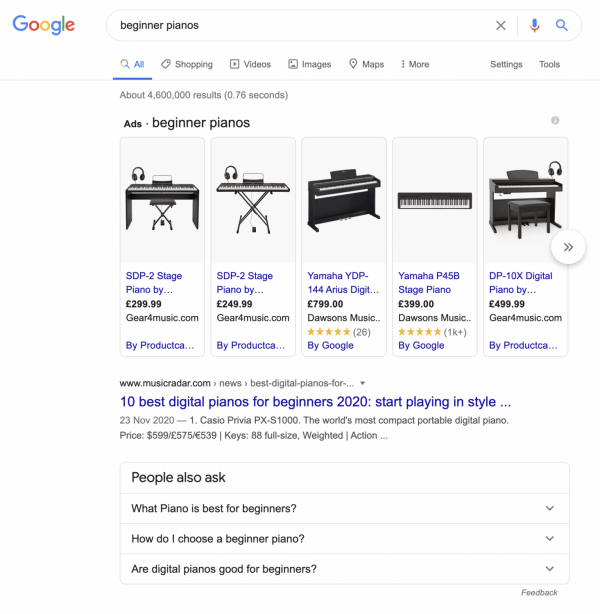
Clarifying who you plan to target with your Google Ad, it’s important to think of some of your likely or ideal customer profiles. It’s useful to consider their age, financial status, level of musical expertise and music genre preferences - and whether they want to buy the musical instrument for themselves or as a gift. All of these aspects affect how your Google Ad can be presented, ultimately impacting your ad campaign's success. Crucially, you also need to consider where your target audience is located, which we’ll look at next.
Location: sell musical instruments online or in-store - or both?
Promoting your local musical instrument store with Google Ads
The majority of the online musical instrument retail market is dominated by larger retailers who can typically offer the most competitive prices, especially in the low- to medium-priced brackets. However, if your business isn’t set up to compete in this market, Google Ads can be used to promote the key benefit of a brick-and-mortar shop that a purely online retailer cannot compete with: try before you buy.
Even for low- to mid-priced musical instruments, many customers prefer to play their potential new purchase before they buy. A Google Ad explaining the benefit of trying the instrument in your store before they buy is a compelling way of enticing customers within a specified geographical radius of your shop. Identifying the proximity of competing physical stores combined with tools from Google and third parties can help identify the potential for online advertising success within your geographical area.
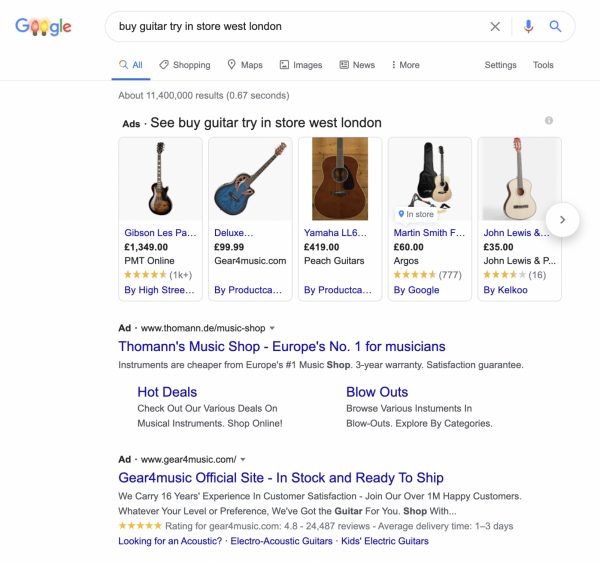
Sure, some customers may plan to try the instrument in your store and then buy at a reduced rate online. Communicating to them that the instrument they have in their hands won’t be identical to others of the same model is one way of reinforcing the purchase with you. More importantly, the benefits of the in-store experience, such as a personal instrument set-up, playing advice or lessons are advantages which a purely online retailer cannot match, whatever price they offer.
Sell the benefits of in-store musical instrument purchase
The in-store experience is even more relevant at the high-price end of the musical instrument market. This is particularly the case for fragile instruments which may not be trusted to deliver or instruments which are typically more expensive by their very nature, such as a cello. Customers looking to spend several thousand pounds on a violin may expect to travel significantly to try their potential purchase at a physical store. A Google Ad can be used to elevate your business presence to an online audience by selling the excellent pre-purchase, in-store experience your customers will receive.
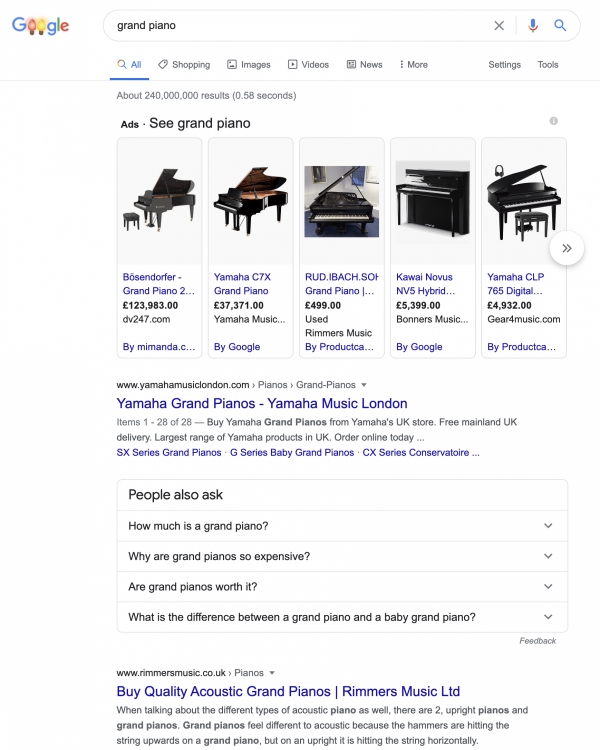
It’s key to remember that if you are using Google Ads to promote visits to your shop, the success of the advertising campaign alone isn’t enough. The in-store experience must match the ad's promise, from the professionalism of your store and its surroundings to your staff's friendly welcome and expertise. Until the customer has made their purchase, they can always walk away.

Free Report
Spot Errors, See Strategies,
Our Free Report Reveals Key E-Commerce Fixes.
Book Your Call
Selling musical instruments online with Google Ads
Despite the competition of bigger market players, it’s certainly achievable for smaller, independent retailers to sell musical instruments online - and to a national or even international target market. It’s crucial that your offer is a valid comparison in terms of price, product quality, and supporting information to help drive the sale, delivery, and service.
It’s fundamental to ask yourself: why would a potential customer buy a musical instrument or accessory from our online store compared to a competitor? Then, you need to be able to demonstrate these answers to your online customers in your Google Ad and supporting website information. Even if you can’t compete on price, you can promote a positive differentiator in your Google Ad to help you successfully sell online. This could include niche items like rare or vintage instruments, specific brands, or bespoke, personalised products.
Whatever you sell, some items are more suitable for online sale than others. While the expensive violin may be less likely to receive a direct online sale, recording equipment or tuners, for example, are more practical online buys. Items like these are less interactive than the feel of an instrument, and there’s generally less variation in manufacturing quality.
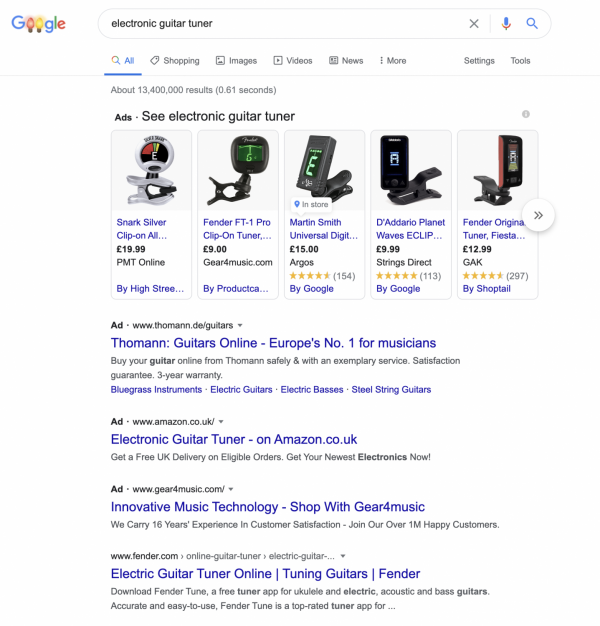
For some accessories, from strings to recording software, it’s far less likely that they would be tried in-store and as a result, these items are more likely to sell in greater volume online than from bricks and mortar stores. As a result, they are typically subject to higher price competition. Therefore, it’s crucial that you keep your commercial objective in mind when deciding which items and services to promote to ensure that your sales operation is successful.
Ensuring profitability in online retail
Being price competitive is one thing, but ensuring that your advertising campaign is profitable is also crucial. You may have a high demand for interesting guitar picks; however, if the cost of the Google Ad campaign and the gross cost of sale outweighs your expected profit, you should choose another item to advertise.
As for niche items, it’s obviously important to identify whether demand exists. You might be the only online seller of budget triple-necked guitars, but there could be a reason why your Google Ads may not yield results. Using tools from Google, third parties or by requesting help from a Google Ads expert, you can determine your potential online market size and expected return before you spend a penny on promotion.

Getting Started With
Performance Max
Download Our Step-by-step guide to getting started with Performance Max Shopping Campaigns for your Shopify Store
GET YOUR FREE EBOOKFREE EBOOK
Google Ad content for musical instrument retail
Your ad will be one of many; therefore, it has to be compelling, and it’s crucial to explain in a concise and positive way why the search engine user should click on your ad. This means that it has to catch the eye with a benefit, whether that’s a keen price, the service you provide or local proximity. Keyword placement within ads is also crucial, and a benefit could relate to the brands you offer, which also builds credibility by association.
In Crafting your ad copy, the language must also engage with your potential customer. For example, the language and tone when communicating to an 18-year-old metal enthusiast looking for a shred-friendly guitar is likely different from that used when engaging with a 50-year-old classical fan researching a grand piano. Make sure you write the ad for the specific customer in mind.
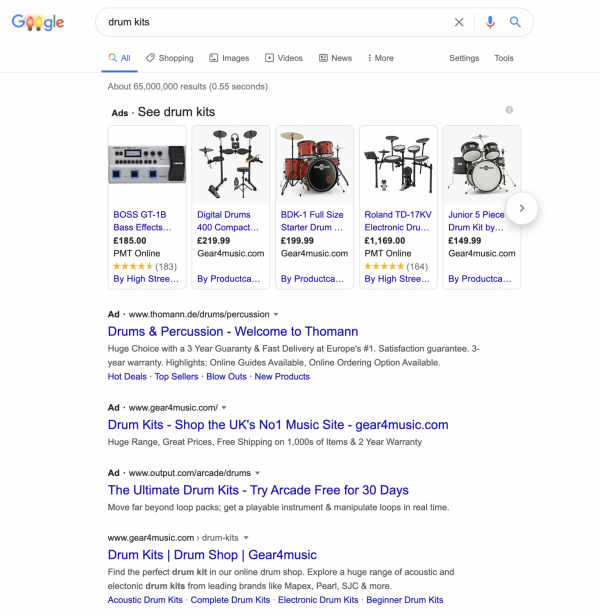
A crucial ingredient of a Google Ad is the call to action, an instruction or request explaining what you want the person looking at your ad to do. Depending on the objective of your ad campaign, it may be more effective to state in the ad that you have the item in stock and offer a trial service and advice, combined with a call to action which says ‘come and try’ instead of ‘buy now’.
If your aim is to sell directly online, Google Shopping is ideal for selling specific models of instruments. You’ll need to provide a high-quality image with your product description, and for more information on how to advertise with Google Shopping, read about What are Google Shopping ads and why use them?
Website landing page
When the customer clicks on your Google Ad, the website landing page they arrive on has to be relevant and specific to the promise delivered in the ad itself. This means presenting a specific content page rather than a general homepage about your musical instrument shop.
Whether your customer is looking to try out your range of a certain brand of guitars or buy a specific mixing desk, the customer is already armed with a certain level of information, which you will know from the keywords they’re using to search. The role of your landing page should be to readily fill the gaps in their knowledge to give them the confidence to move to the next stage. This could be confirmation of specific details on a musical instrument, stock availability and price, information about the range of instruments you have for customers to try in-store, and details on your practice facilities.
It’s important to present this information in a clear and compelling way. Depending on the communication aim of the landing page, it could be useful to provide content in video format, too, whether to show the quality of the instrument or perhaps the facilities you have available in store. However you communicate it, it’s vital that you answer the questions your customers will likely want to know before they are persuaded to engage further.
As with your Google Ad, your landing page should also have a clear, compelling call to action, inviting your customer to the next step. Whether you want them to call or book to try out an instrument or purely to ‘buy now’, it’s vital that you clearly guide your customer in the right direction.
The best time to advertise musical instruments with Google Ads
Google Ads can be presented 24/7, but what matters is when your target audience is most likely to research or buy their musical instrument online. For most customers - i.e. non-professional musicians - evenings and weekends might be the most likely occasions. More specific times of the day can be further identified for more precision in success, such as typical lunch and break times.
As with all items and services promoted online, trends will emerge regarding the most effective times your Google Ad should appear. Again, this depends on what you are advertising and to who. A research trial can show you how to identify the most productive times, along with Google’s metric measurement tools. A Google Ads agency can also show you how - it could be the difference between your ad receiving tens of clicks or several thousand.
The time of year is another aspect to consider. For example, approaching Christmas is a favourable time for the sale of beginner instruments and packages, like a guitar, amp and lead, which are bought as gifts typically by parents buying for children. This kind of sale will also inform what message to advertise and to who. Considering our Christmas gift example, the situation you should message for would include a less knowledgeable customer requiring advice, an easy instrument set up and a competitive price.
The right device for an online musical instrument purchase
As you have control over whether your Google Ad appears on phones and tablets compared to computers, it’s useful to understand the hardware your target audience uses to research and buy their musical instruments. A relatively straightforward purchase like a low- to mid-level guitar, with limited options to configure from each model, is quite easy to specify and buy with a few clicks, lending itself to purchase via smartphone. On the other hand, a mid-to-high-level drum kit, with numerous options to choose from within the purchase, is more complex and easier to manage on a laptop or PC.
Targeting your Google Ads for the type of device also depends on the call to action and the complexity of the information your customer must review before completing the process. In general, the more complex the action required, the more likely the user is to move away from a smartphone to a laptop. However, this doesn’t consider age demographics, where younger customers, more used to hand-held devices and who generally have less cash at their disposal, may not have the option of a computer to accompany their smartphone.
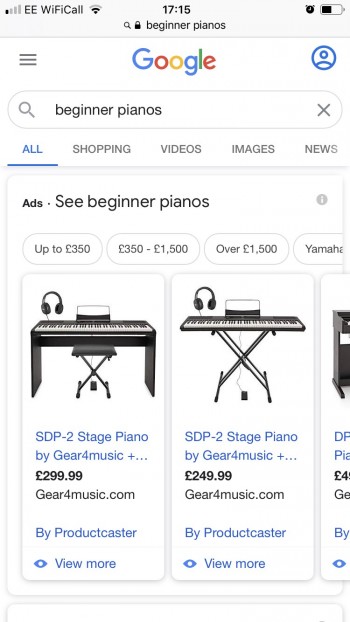
Metrics: traffic and how to measure conversions
When you begin with Google Ads, measuring their success should be based on the original objective you set out with. If your aim is to sell instruments online, understanding Google’s typical sales conversion metrics will be key to defining the profitability of your ads and ensuring they remain effective over time.
Alternatively, if you’re using Google Ads to encourage customers to your store, you’ll need to measure results in a different way. This could involve the metrics of an online appointment service by simply tracking visitor footfall over the duration of your ad campaign. You could also use offline, real-world techniques like surveys or good old customer conversations to glean your knowledge.
Putting it all together: Google Ads for musical instrument retail
How you advertise with Google Ads depends on what you sell or promote and to whom. Clarifying this at the outset and creating a plan based on the variables discussed will help you create the most successful, cost-effective Google Ads campaign from the outset.
If you have questions about how to implement your own Google Ads campaign or your bespoke Google Ads plan to increase business for your musical instrument retail operation, please get in touch.

Book A Discovery Call
Looking for tailor-made PPC strategies? Our team is here to help you maximize your online store's potential. Book a discovery call with us for personalised insights and solutions.
Book Your Free ConsultationBook Your Call